How To Choose The Best Guitar Strings For Electric Guitar – Reviews And Beginners Guide
We may also earn commissions on purchases from other retail websites.

Last Updated Jul-25-2018.
We felt that the strings we recommended in our chart were still the best on the market and therefore didn’t need to be changed. However, we have added some extra tips and information into the article itself to help answer some of your questions.
If you have read our guide to the best guitar strings you’ll know how important strings are to the tone and playability of your electric guitar.
The quality of the materials, the gauge of the strings, the winding methods, and special coatings all influence the sound and performance of your guitar. This means buying the right guitar is only half the battle – buying the right strings is the next step!And while you may have already found a brand of string you love, it’s worth reminding yourself of what’s out there – just in case there’s something that may suit you better.
Check out our quick chart, highlighting some of the best strings on the market today, before reading our guide to electric guitar strings and a look at some of the most popular brands.
10 Recommended Electric Guitar Strings:
| Image | Guitar Strings / Rating | Summary | Check Price |
|---|---|---|---|
+ -  | Ernie Ball 2221 Regular Slinky Total of 4.60/5 | Ernie Ball’s best-selling regular slinky strings, with a .010-.046 gauge. | |
+ -  | Ernie Ball 2223 Super Slinky Total of 4.80/5 | Super light (.009-.042) electric strings from the popular American manufacturer. | |
+ -  | Elixir Light NANOWEB Total of 4.80/5 | Elixir’s light gauge (.010-.046) strings with a bright and protective NANOWEB coating. | |
+ -  | D'Addario EXL160 Nickel Wound Total of 4.80/5 | A super light gauge (.009-.042) string with Elixir’s warm-toned POLYWEB coating. | |
+ -  | D’Addario EXL110-3D Total of 4.80/5 | D’Addario’s best-selling string set – nickel-wound regular light gauge (.010-.046). | |
+ -  | D'Addario NYXL1046 Total of 4.80/5 | A light gauge (.010-.046) set of D’Addario’s popular new super-strong NYXL series. | |
+ -  | DR Strings Tite Fit 10-46 Total of 4.80/5 | Nickel-plated roundwound strings with a light .010-.046 gauge – good all-rounders. | |
+ -  | Fender 3150R Original Bullets Total of 4.80/5 | Classic Fender bullets, made from nickel with a light gauge (.009-.042). |
Ernie Ball
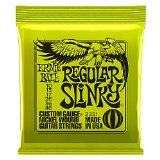 We start this list with an innovative string company that was founded in 1962 by the famous American entrepreneur and musician, Ernie Ball.
We start this list with an innovative string company that was founded in 1962 by the famous American entrepreneur and musician, Ernie Ball.
These days they create a huge range of high-quality, long-life, and reasonably priced strings for all instruments, although specialize in those for electric guitars.
Their strings are used by legends such as (take a deep breath…): Jimmy Page, Slash, Paul McCartney, and Steve Vai, as well as bands including Green Day, Metallica, Iron Maiden, The Eagles, and Blink 182 – as proudly highlighted on the back of their string packets. With such endorsement you don’t need us to tell you how good Ernie Ball are!
The Californian company are famous for their slinky strings and have a huge range varying in gauges, metals and coatings, although their nickel-plated steel Regular Slinkys are an excellent choice for beginner, experienced, and professional guitarists alike – in fact, this affordable set is used by both Eric Clapton and Keith Richards!
However, if you like a little experimentation, Ernie Ball’s Tone Pack offers a good way to try three distinct sets, all with different sounds and output qualities. Finally, Ernie Ball’s eye-catching Element Shield packaging keeps the strings fresh, so you are guaranteed that ‘just-off-the-line’ feel whenever you open them.
Elixir
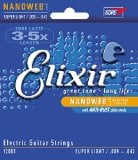 When Elixir launched their groundbreaking coated strings in the late nineties, the technology was revolutionary and remains hard to beat today.
When Elixir launched their groundbreaking coated strings in the late nineties, the technology was revolutionary and remains hard to beat today.
Their unique POLYWEB and NANOWEB coatings protect the strings from dirt, rust and corrosion, and therefore prolong their lifespan. This also provides other benefits, such as feeling smoother with less of that bothersome finger squeak.
The difference between the two coatings is subtle but affects the tone – the original POLYWEB coating gives a warmer, so-called ‘played-in’ tone, while the ultra-thin NANOWEB coating offers a much brighter sound.
While their choice of strings is limited in comparison to other brands, Elixir still offer a good range of electric gauges, from Super Light to Baritone in the NANOWEB range, with just light gauges in the POLYWEB series.
Their standard Light Strings, with a gauge of .010-.046, are a good place for beginners to start. Elixir also cater for 7-string and 12-strings guitars.
It’s worth noting that while coated strings tend to be more expensive than regularstrings, the benefits are clear to see as they last so much longer – meaning you don’t have to buy them as often. This is also a benefit if you find changing your strings a chore!
D’Addario
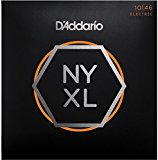 Although officially founded in 1974, D’Addario’s history with strings for guitars stretches back to the 1930’s, making them one of the oldest and best known guitar string manufacturers in the world.
Although officially founded in 1974, D’Addario’s history with strings for guitars stretches back to the 1930’s, making them one of the oldest and best known guitar string manufacturers in the world.
While they also make acoustic and bass strings, their XL strings are some of the most popular strings around and are a great all-round solution known as ‘The Player’s Choice’ for beginners, experienced, and professional guitarists alike. They are used by maestros such as Joe Satriani, Lenny Kravitz, Robben Ford, and the Red Hot Chili Peppers’ Josh Klinghoffer to name a few.
The American manufacturer has also introduced a new technology-packed NYXL string range, which uses a high carbon steel alloy to make them super strong and – as D’Addario promise – allows them to ‘bend farther, sing louder, and stay in tune better than any guitar string you've ever played before.’ Quite a claim, but one which is backed up by guitarists across the world.
Whatever the series, D’Addario strings come in a wide range of gauges, from super light (.009-.042) to extra heavy (.012-.060) and will suit any style of guitarist, although their nickel-wound regular light EXL110-3D are their best-selling set, with a distinctive and long-lasting bright tone.
DR Strings
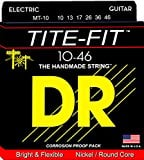 Based in New Jersey, DR Strings was founded in 1989 and still produce their strings by hand with love and attention.
Based in New Jersey, DR Strings was founded in 1989 and still produce their strings by hand with love and attention.
Their bass strings are very popular, but DR also make a good electric guitar string, and are used by guitarists around the world, including a host of professional artists – there is even a Dimebag Darrell Signature series, used by the late Pantera guitarist himself.
The brand has several ranges of electric guitar string, including their classic all-rounder Tite-Fit series which feature nickel-plated roundwound strings on a round core, and come in a range of gauges – excellent for everything from blues to heavy rock. Their more mellow Pure Blues range are their go-to vintage electric string, made with pure nickel for a true vintage tone with increased sustain.
They have also introduced the Veritas range, which DR say combine more power with a longer life, while giving advanced tuning stability. This is thanks to their use of the more magnetic Quantum Nickel which is more responsive. DR also produce some cool colored varieties to give the guitarist a chance to really show off during performances, including their super-bright neon multi-colored pack, NMCE-9 DR NEON.
Fender
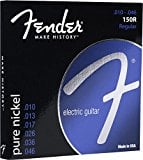 Guitarists, musicians and even non-musicians know Fender – it’s a household name! The legendary American company are kings of producing guitars for all styles, abilities and budgets, and – unsurprisingly – also know a thing or two about making strings.
Guitarists, musicians and even non-musicians know Fender – it’s a household name! The legendary American company are kings of producing guitars for all styles, abilities and budgets, and – unsurprisingly – also know a thing or two about making strings.
They have a huge range of strings, varying in materials and gauges, although their classic Fender 150R Pure Nickel strings are a very popular medium gauge set (.010-.046), great for everything from rock to jazz.
Fender are also famed for their innovative ‘bullets’ and ‘super bullets’, which are strings that have, as the name suggests, bullet-shaped bridge end pieces, which increase both sustain and tuning stability as the string has greater contact with the bridge.
Their nickel 3150R Original Bullets, with a light gauge of .009-.042, are well worth trying out. Finally, as you’d imagine, professional artists enjoy playing with Fender products as much as the next guy.
One of these is the celebrated Swedish shredder Yngwie Malmsteen, whose Yngwie Malmsteen Signature strings are very popular. They’ve been custom designed with specific wrap ratios and gauges (.008-.046), to offer huge speed and tone – excellent for extreme string bending and scalloped fretboards.
While a low quality guitar can still sound great in the hands of a professional, rusty old strings will make an electric guitar sound awful no matter who is playing.
This is why you should always treat your guitar with respect and make sure it’s equipped with a good set of strings that match your playing style.
Guide to Buying The Guitar Strings You Need
The selection of strings on the market is huge, which is great as it pretty much guarantees you can find the perfect string for you, although all the numbers and materials can be a little confusing to beginners.
Gauges
So let’s start with gauges, which tend to be categorized as heavy, medium, and light sets, although you will find mixed hybrid sets, as well as super light and super heavy sets from some brands.
There are no set rules, and one manufacturer’s ‘heavy’ can be different from another, although in general the weights are roughly the same. Let’s use the famous string makers D’Addario as our benchmark.
For beginners not sure of exactly what they need, a set of medium gauge strings (D’Addario mediums are typically .011-.050) can be a good choice as you will find them well-balanced for general styles of play.
Light strings (D’Addario .010-.046) are typically easier to play with as they take less pressure to fret and bend. Lead players and beginners enjoy light strings for this very reason.
While they are more likely to suddenly break, they are important for vintage guitars as they exert less tension on the guitar’s neck. Heavy strings (D’Addario .012-.054) are superb for powerful, aggressive strumming and low tunings, so guitarists playing heavy rock and metal will benefit from heavy strings on their electric guitar.
Materials
When it comes to materials, many metals can be used to make effective strings, and all metals have their own unique tonal characteristics and feels.
Nickel-plated steel strings tend to be the most popular choice among electric guitarists, as they have a well-balanced tone that works for many different styles.
Pure nickel strings have a smooth and warm tone good for vintage styles, while stainless steel strings give a very bright and crisp sound. There are many other metals, such as chrome, titanium, cobalt, and copper-plated steel, which all have their own properties.
Construction
String manufacturing methods such as the winding and core can play a part in tone and feel too.
We’ve discussed the main differences between windings and core shapes in our article on the best strings, but for beginners especially, it is good to be aware that the majority of electric guitarists choose roundwound strings with a hex core, as this provides good grip and a balanced sound, as well as being the cheapest way to produce a string.
Coatings
Finally, you may want to consider different coatings. Our section on Elixir below will give you details on their coated strings, which enhance the lifespan and playability of the strings.
There are also various colored strings available – neon, multi-colored, and even all black – which can add a visual edge to your on-stage performances.
What are the Best Electric Guitar Strings for Beginners?
When it comes to beginners, we always recommend a set of light guitar strings, as they come with many benefits. The main advantage is that they take less pressure to fret and bend, so are easier to play and more comfortable for beginner fingers.
Although there is no definitive gauge (for example, a set of Fender lights, may have a slightly different thickness to a set of D’Addario lights), light strings for an electric guitar tend to arrive in gauges of either .009-.042 or .010-.046.
These numbers refer to the thickness of the string, measured in 1/1000th’s of an inch.
There is no defined ‘best string brand’, so choose whichever brand suits your budget and style. For example, some will offer coated strings, which makes sliding around the fretboard a little easier. However, these tend to cost more than uncoated strings.
Is There a Difference Between Acoustic and Electric Guitar Strings?
Yes, there is – in fact there are several differences, which makes purchasing the correct strings for your guitar essential.
The biggest difference is the materials each are made from. Both acoustic and electric guitar strings are made with a steel core, although are typically wound with different materials.
Electric strings usually feature steel, nickel, cobalt or chromium alloys for their magnetic properties, allowing the pickups to pick up the string vibrations.
Steel-string acoustics, on the other hand, are usually wound with bronze and brass alloys, offering more acoustic volume and resonance, as well as a warmer tone.
Strings between an acoustic and an electric also differ in gauge. Acoustic strings tend to have a heavier gauge, which gives the guitar more resonance. By comparison, electric strings are often lighter.
Note that, in this section, we are talking solely about steel-string acoustic strings, not nylon strings (for use on a classical guitar). For more on these, check out our page on classical guitar strings.
How Often Should Guitar Strings be Changed?
The good news is that you don’t have to change your strings every day (how annoying would that be!). Nor do you have to change them every week or every month.
The tried and tested rule for string changes is every three months or 100 hours of playing (whichever comes first). However, you may want to change them more or less often depending on the amount you play and how you store your guitar.
Finding that your strings look discolored, corroded, rusty or feel overly dry or gritty usually means a string-change is needed. The same goes for the sound – if your guitar sounds dull or lifeless, this is usually a sign that new strings are required. If the guitar falls out of tune more often, this can also be a sign.
What Does ‘Warm’ and ‘Bright’ Mean When Talking About Tone?
When talking about guitars and strings, you will hear the terms ‘bright’ and ‘warm’ very often. But what do they mean? It is actually very hard to put into words what each means as they are so subjective and each person will define tone slightly differently.
Still, for the record, here’s what we have deduced! ‘Bright’ tones can be described as crisp, cutting, sharp, chiming, jangly or biting, and are more associated with trebly sounds (and perhaps guitars such as the Tele and Strat).
On the other end of the spectrum, ‘warm’ tones can be described as smooth, meaty, thick, dark and creamy, and tend to have more bassy connotations – often associated with a Les Paul.
The Final Word
These five are certainly not the only electric guitar string brands out there, but by highlighting some of the most popular manufacturers we give you an idea of the amount of choice available. Other brands selling quality strings, such as Cleartone, Jim Dunlop, GHS, Rotosound, Gibson, and PRS, are all worth your attention too.
Hopefully our short guide to buying electric strings and some of the top brands will have inspired you to go and try some out.
It’s not essential to buy every single pack we have listed (unless you have the time and budget to try them all!) but by experimenting with a few different strings, you will eventually find something that suits you and your electric guitar perfectly!
Finally, if you’ve never changed guitar strings before – or struggled the last time – make sure to check out the video from Fender below, which will guide you through the process in five minutes.
Good luck and happy string shopping!





Louie Whitestone says
I have been playing for 54 years. Mostly driving rhythm but fair share of solos. I use S.I.T. Strings. Nickle Wound with a hex core. .009 /.042 or .010/.046. These strings have Fabulous Tone and Stay In Tune much longer. Nice on stage.
gene hansbrough says
I just got a Rickenbacker 12 string electric I am a medium level player what strings do you suggest
Kenny says
Been playing for more than 25+ years and have tried almost every brand but stuck with the obscure Dean Markley ‘Blue Steel’ line for over 20+ years – very happy mainly for their longevity and sound. I use custom-lite gauges 9-46. Sadly the Blue Steel series are no longer made so I made the switch to Elixir ‘Nano’ 9-46.